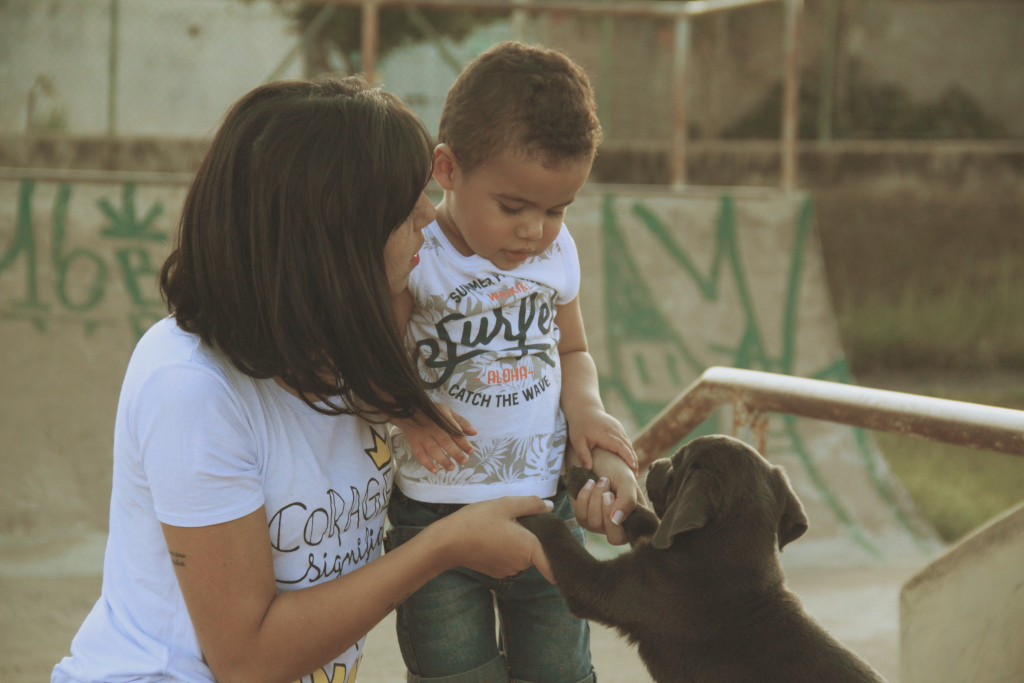SingaporeMotherhood | Parenting
January 2023
What Makes a Child Commit Animal Abuse

When the news about the child who threw a cat from the 22nd floor broke, Tan Wei Jie, co-founder of Good School Learning Hub and father of a two-year-old boy, was deeply shocked and disturbed. After watching the chilling video that circulated via WhatsApp, he couldn’t help but wonder how he would react if his own child committed animal abuse. Wei Jie reached out to us to share his knowledge, experience, and expertise on the topic.
As an educator with 15 years of experience, the English specialist has a soft spot for troubled youth. Through his tenures as an MOE secondary school teacher and Nanyang Polytechnic adjunct lecturer, he dealt with at-risk students. During NS, he completed a para-counselling course and served as a Basic Military Training Centre instructor supporting troubled recruits.
(See also: 10 Things Teachers Would like All Parents to Know)
What are some reasons a child might engage in animal abuse?
There are both direct and indirect reasons. For direct reasons, legendary English polymath Francis Galton would categorise them under Nature vs Nurture.
1. Nature
A child with psychopathic or sociopathic tendencies may engage in animal abuse.
Psychopath – Some children may inherit certain genes that increase the chances of developing psychopathy. A psychopath lacks empathy, conscience, and guilt. As such, the tendency to inflict pain on animals or others is also likely to be stronger.
Sociopath – Some children with antisocial personality disorder, or sociopathy, may also be more likely to engage in cruelty to animals. They have little or no regard for right and wrong and ignore the rights and feelings of others.
(Sociopaths may seem very similar to psychopathic individuals, but their having a conscience, albeit weak, and just wanting to break the rules may be the slight yet key difference between them.)
2. Nurture
Environmental factors can shape the child into a more cruel person.
Family – The values and behaviours parents and other family members exhibit during children’s upbringing and childhood years can be critical. If a child sees the use of violence every day, they may conclude this is normal behaviour.
Peers – Peer pressure is greater on the young during a phase where they yearn for acceptance. If a child’s friends abuse animals regularly, they may follow suit. Or feel the need to do the same to gain respect and belonging to the group.
(See also: How to Recognise Signs of Peer Pressure in Your Child Plus Strategies to Handle It)
Community – The lack of support and intervention from the community can also contribute. For example, if the child inflicts cruelty on animals but fails to receive positive parental guidance and/or professional counselling. Only when they understand that cruelty is unacceptable can they begin to overcome the behaviour.
Media – Young, impressionable minds may replicate cruel behaviours from shows, social media, or violent games after becoming desensitised to them. Without suitable guidance to tell them otherwise, children may think it is acceptable behaviour. They may then try it on animals without realising the seriousness of the act.

Then what are the indirect reasons a child might be cruel to animals?
This is usually due to the child’s innate sense of curiosity or a way of seeking attention.
Curiosity – Sometimes, children may make a wrong judgement call and commit the act to see how the animal would react. Upon seeing the pain they cause, some children may regret it immediately and never do it again. Others may do it for amusement, without realising the error of their ways.
Need for Attention – Neglected children trying different ways to obtain attention from their parents (usually) may include animal abuse in their repertoire. Consciously or subconsciously, they hope the act would shock the adults into caring. Naturally, intervention by the school or government agencies does lead to the parental contact they crave, even if achieved in the wrong manner.
Can I do something to ensure my children never develop such traits?
If children engage in animal cruelty due to causes related to Nature, it would be difficult to prevent. Only medical professionals like psychiatrists and psychologists are able to assist.
However, it is surely easier to do so for those with factors due to Nurture. Parents must provide a conducive environment at home and promote positive values such as care, concern, and love for others. A broken family, poor parenting, and having abusive and violent family members raises the likelihood of a child developing issues. Giving your child opportunities to interact positively with pets can also make a difference.
(See also: How A Pet Can Help Your Child)
Many serial killers have a history of harming animals when they were young. Does this mean a child who commits animal abuse will grow up a danger to society?
There is no definitive answer to this, but the chances are dependent on several factors. For instance,
Intervention
Are the consequences harsh enough to deter the child from future acts of cruelty? Are the counselling sessions adequate and effective to help the child overcome their cruel tendencies? Can the parents provide the necessary guidance and emotional support to help the child change their ways? Are they able to continue monitoring the child in the following years?
While the response from the authorities should be consistent with the severity of the abusive acts, varying amounts of familial love and support for different children may affect them differently.

Reaction
However, after the intervention, the differing reasons behind the cruel acts determine how fast (or slow) the behaviour fades away. For instance, it is usually quicker if the causes are innocent curiosity or attention-seeking. Those with psychopathic or sociopathic tendencies may need more support.
With individual personalities, children also respond differently to the ‘soft’ or ‘hard’ approach. Some do better when given a second chance through counselling, while others may rehabilitate better if they receive a harsher punishment such as reformative training. Accurate application of intervention methods and assessments of their effectiveness plays a critical part in whether a child exhibiting cruelty to animals at a young age would grow into a serial killer.
(See also: From Juvenile Delinquent in Girls’ Home to Brave Single Mum)
Awareness
Animal abuse and serial killing are crimes of very different severity, although both involve violence and cruelty. Murder generally warrants either life imprisonment or capital punishment. Children engaging in animal cruelty may well be aware of the consequences of hurting another human and hence would only go as far as inflicting pain on animals.
It also takes a combination of more ‘ingredients’ to create a serial killer, namely genetics, environment, trauma, and personality traits. Hence, I believe that for a child with a logical and sound mind, and without all four factors in place, engaging in animal abuse doesn’t mean they’ll grow up a serial killer. However, they may have higher tendency towards aggression compared to a child that is kind to animals.
What are the warning signs for parents to look out for?
It is impossible to be fully aware of what goes on in a child’s mind. However, parents can look for some tell-tale signs, such as when their child
- is indifferent to reading or watching about pain and suffering
- finds the sight or knowledge of others in pain amusing
- spends much time playing and enjoying violent games (and ignores or avoids discussions about it)
- lacks close friends or relatives and is alone most of the time
The absence of positive social support coupled with an inclination towards violence can increase the probability of a child becoming cruel towards animals or others.

It’s often said that children can be cruel (unknowingly). When is it ‘normal’ and when is it time to be concerned?
Children are constantly exploring and learning about the world around them during their growing-up years. Some may be cruel towards animals out of amusement and curiosity. Statistics show that 3-44% of children have abused animals at some point during their childhood. Parents need not be overly worried when they first find out about an isolated incident. However, parents should definitely speak to their child about it.
Of course, parents have different methods and varying amounts of knowhow when it comes to effectively communicating with their child. I suggest taking a more permissive and authoritative approach when teaching children about animal abuse. I believe it would also be more helpful in solving the underlying issues.
(See also: Why the Alternative to Tiger Mums is not “Laissez-faire Parenting” but “Attentive Parenting”)
If a parent confirms their child to have cruel tendencies towards animals or even other children, what should they do?
They should take action immediately by first speaking to their child. Diagnosing the issue accurately is key in administering the right solution. Provide support and monitor to see if the behaviour persists. If it continues, consult a child psychologist, who has more tools and expertise than any average parent.
Should the frequency and intensity of animal abuse increase despite intervention, parents should allow the authorities to step in. Don’t procrastinate and adopt a wait-and-see approach in futile hopes that their child will voluntarily change. They can only help their child by acknowledging and accepting reality and seeking professional help decisively. Contact various agencies, such as the police, or the SPCA, for help.
If I come across a child (not my own) abusing an animal, what should I do?
Inform someone who can provide intervention to help them: parents, school, and/or the authorities. It may seem harsh to involve the police for young children, but it could be essential in providing earlier intervention. A disbelieving parent may not get their child the help they need soon enough.
Classical conditioning suggests that the quicker the conditioned responses after the cruel act — ironically both are performed on animals — the better the effects. A short-term adverse reaction from the child in knowing they are in trouble with the police is a small sacrifice in achieving long-term wellness. At the very least, the child would be clearer on the severity of their cruel behaviour.
Final Thoughts: If It Were My Child…
Frankly, as a father myself, I know all my experience and knowledge would be of little use to overcome the heartbreak and shock of discovering my lovely, innocent child capable of delivering pain and suffering onto another living being.
Tan Wei Jie, co-founder of Good School Learning Hub
After processing my grief, I would try to find out from my son the causes of his cruel act and provide the emotional support that he needs. It is often difficult for us parents to ascertain the real intent as children may resort to lying first when they get into trouble. I would speak with his teachers, classmates, and their parents to see if they can shed any light on the matter. It takes a village to raise a child, after all.
I would then educate him as much as possible using both the soft and hard approach. Firstly, by reassuring him that it’s okay to make mistakes and promising to overcome the episode together as a family. Then clearly setting (or resetting) boundaries of acceptable behaviour, as well as the consequences of violating the rules. Failing this, I would take my own advice as laid out above.
Featured image: Trym Nilsen on Unsplash
All content from this article, including images, cannot be reproduced without credits or written permission from SingaporeMotherhood.
Follow us on Facebook, Instagram, and Telegram for the latest article and promotion updates.





